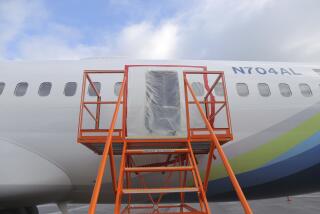Northrop Officer Apologetic as Panel Rips Firm for MX Record
Northrop was attacked for “incredible incompetence” and a “sorry record” by a Congressional panel Wednesday in a lengthy hearing called to look into a wide range of problems in the company’s production of the MX missile guidance system.
Rep. John D. Dingell (D-Mich.), who called the hearing as chairman of the House oversight and investigations subcommittee, said Northrop is under seven separate criminal investigations involving alleged misconduct on its MX missile contract.
Northrop Vice Chairman Frank Lynch repeatedly acknowledged that management of the Los Angeles aerospace company in the MX program has been unsatisfactory in some areas, but he said the company was doing everything possible to remedy the situation.
“I am sorry,” Lynch said in response to criticism that he was not showing enough concern about such problems as late deliveries, suspect products and flawed manufacturing procedures.
“I tried to express my concern with all of these (problems). I take them seriously and importantly. They need to be resolved. The program cannot continue on that kind of a basis. I don’t quite know what more I can say to you that would cause you to believe that I am concerned. I wish I had the personal capability to communicate that to you. I don’t know what more I can say.”
The Dingell panel, citing internal company audits and Air Force audits dating back as far as five years, said Northrop had not responded to repeated warnings of problems. Rep. Ron Wyden (D-Ore.) said Northrop “management is sitting on its hands.”
For his part, Lynch said management generally had a “mind set or a mental attitude” that prevented it from acting more quickly to improve conditions.
He told the panel, a House Energy and Commerce subcommittee, that Northrop has moved 30 key people out of their management jobs. Those include the vice president in charge of the Northrop Electronics Division, where the MX work is under way in Hawthorne, as well as the head of quality control and the division’s financial vice president.
The apologetic tone of Lynch’s remarks contrasted with the testimony Northrop Group Vice President David Ferguson gave to the House Armed Services Committee last summer. The hearing Wednesday marked the fourth time Northrop’s problems with the MX have been aired in Congress.
Moreover, the hearings are not over, because House Armed Services Committee Chairman Les Aspin said earlier this week that he intends to hold further sessions. The Northrop guidance device, called the inertial measurement unit, or IMU, has become one of the most controversial defense programs in recent history. The MX, carrying 10 nuclear warheads, is believed to be the most lethal weapon ever developed.
Learned From Employees
In the hearings Wednesday, in which Lynch testified for almost four hours, the subcommittee raised concerns about a number of other Northrop programs that had encountered problems, including allegations that the company falsified test results on parts for the cruise missile system at its Pomona operation.
Lynch disclosed that Northrop is shutting down its small Pomona plant, which employs about 20 people in the production of guidance devices for cruise missiles. The operation will be moved back to its parent division, the Precision Products Division, in Norwood, Mass.
“We discovered problems in our Pomona plant, where there were falsified test results being presented,” Lynch told the subcommittee. Lynch said Northrop learned of the problems from employees who reported the activities to the Air Force, prompting Dingell to ask why employees did not bring complaints directly to management.
“Unfortunately, the manager of the plant was involved in the falsification of the tests,” Lynch told Dingell. “If I were an employee in that position, I do not believe I would go to that individual.”
Northrop suspended the plant manager and the quality assurance manager this summer. Meanwhile, the Air Force is investigating, and a grand jury is also believed to be looking into the matter.
Lynch’s testimony also appeared to contradict some of the statements that Ferguson made last summer when he was answering the company’s critics.
Fictitious Companies
Lynch acknowledged that some parts purchased by fictitious companies set up with Northrop petty cash funds may have found their way into IMUs.
The fictitious companies were set up to bypass the normal procurement system, which worked too slowly.
“We cannot say for sure and precisely and definitely where the parts all turned out to be because, unfortunately, that traceability does not exist,” he said.
He was sharply critical of the existence of the fictitious companies, saying: “It was one of the lapses in judgment to use funds for that purpose. It is not a policy or practice that I support or condone.”
Nonetheless, the subcommittee said it was very concerned that some of the parts were purchased from unqualified suppliers and ended up in missile hardware.
More to Read
Inside the business of entertainment
The Wide Shot brings you news, analysis and insights on everything from streaming wars to production — and what it all means for the future.
You may occasionally receive promotional content from the Los Angeles Times.











